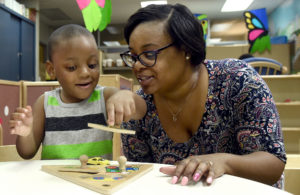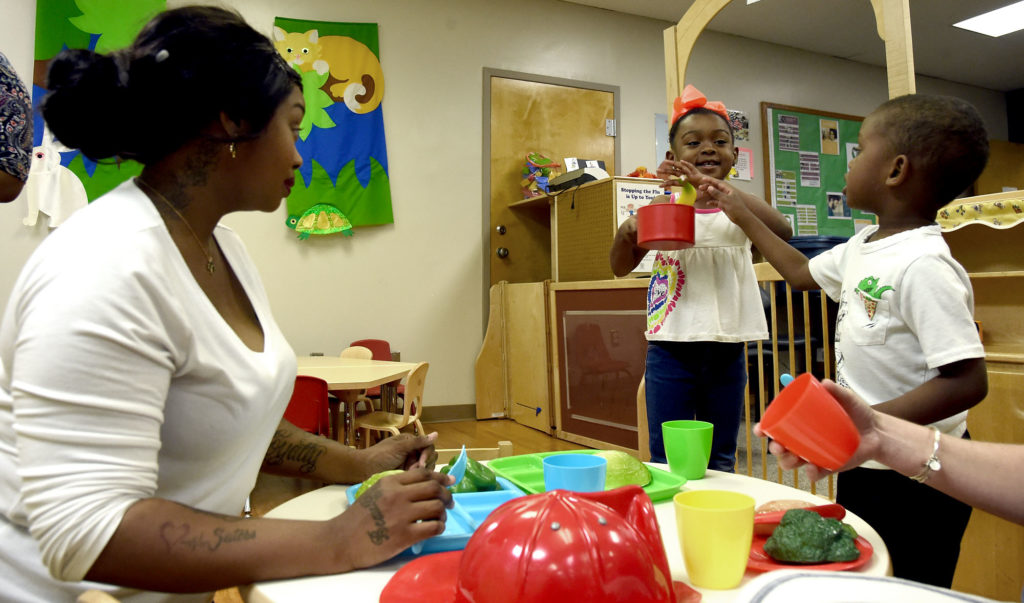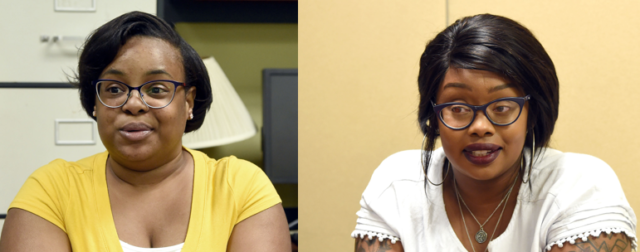By Erica Wright
The Birmingham Times
The University of Alabama at Birmingham (UAB) Early Head Start Program is about helping families help themselves. Here are two families that are thriving.
Ebony Marshall

When Ebony Marshall and her then 18-month-old son Bryson first joined the UAB Early Head Start Program, he could barely say two or three words. That was in September 2017.
“I didn’t really know what developmental milestones to look for and which goals he was supposed to be reaching, but our [home visitor, or] family partner, came in and brought a book that had all the goals [babies] are supposed to reach [every] month,” Marshall said.
Once Marshall realized with help from staff in the program that she was her son’s first teacher, Bryson, who is now 3, she has been able to grow and develop with the child.
“Now, he knows how to spell his name, he knows his ABCs, he can count to 20, … he’s just like a little butterfly, like he has come out of a cocoon,” said Marshall, 29.
UAB Early Head Start is a home-visiting, family-focused, child-development program that serves pregnant women and children, birth to 3 years of age, in Jefferson, Walker, and St. Clair counties; it also provides information to families about other community resources, such as adult education, vocational training, housing, and substance-abuse services. Marshall and her son are one of about a dozen families in the program, which serves approximately 88 children.
Since September 2018, Marshall has served as president of the Early Head Start Program’s Policy Council, a group of parents that act as the governing body that helps to run the program.
Brittney Patrick

Brittney Patrick, 32, first joined the program when she was pregnant with her oldest daughter, Tamia, who is now 15. At the time, she was living in a shelter in Chelsea.
“When I first got to the shelter, they gave me a list of resources, and this program was at the top,” she said. “It gave me a sense of purpose.”
Patrick, who has four children, remembers, “One of my sons couldn’t talk when he got here, and people would always ask me if he was mute. … he just wouldn’t speak outside of the home. We got him a speech therapist and got him involved in all of these services, and now he talks up a storm.”
Another one of Patrick’s sons just graduated from the Jefferson County Committee for Economic Opportunity (JCCEO). He, too, was in UAB’s Early Head Start, which helped all of Patrick’s children. The program, she said, got them to be a lot more social. “It got me to be a lot more social, [too],” she said. “It gives you that confidence as a parent that ‘I can do this, and I’m doing a good job.’”
Her parental skills increased as a result of the program, Patrick said.
“When all my kids went to school, I came in prepared like, ‘This is what I expect. I want to be involved. This is what I would like for them to learn and what I’ve already taught them.’ … I think [being in the UAB Early Head Start Program] might have prepared me a lot more than it did the children because, … instead of just dropping them off, I’m a lot more involved with my kids teachers as far as how they learn, what they learn. I know how to make my voice heard and be an advocate for my children and my family.”
Patrick came to the program pregnant from the King’s Home in Chelsea, Ala. Once she got to UAB’s program she was introduced to family partner La’Tanya Dawson, who “became one of my best friends,” Patrick said.
“I would call her all the time for whatever: family stuff, kid stuff. I just utilized her any way she would allow me to.”
All of her children are doing well in school now because they have gone through the program, Patrick said. They love learning, and they have great social skills. Patrick has grown through the program, as well, and serves as a member of its Policy Council.
“It gave me something to do because we would have a meeting, and I would spend all week preparing,” she said. “It made you feel like you were included with what was going on with you and your children versus being in a shelter somewhere downtown where people are telling you when to wake up, when to eat. … This is a place where they give you the freedom to be yourself.”
As a repeat client, Patrick speaks of the program’s benefits to anyone who will listen.
“I told my sister about it. When I was pregnant and would go to the doctor’s office, I would tell other women, ‘Hey, have you heard of this program? You should apply. … I’ve been here so long that I’ve kind of become an activist for the program and for my children because it’s important to be involved and be that advocate for your children.”





